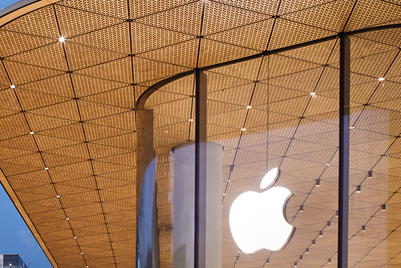
On October 13, Apple debuted its annual iPhone update with its latest model, the iPhone 12. Though delayed, the product release was much anticipated, especially as China is Apple’s second-largest market by revenue. However, to fans dismay, the brand’s infamous Apple Event livestream was made unavailable at the eleventh hour with no explanations, and ultimately the new phone received a mixed reception within the Chinese market.
Trending on Weibo, the #iPhone12 tag reached over six billion views in discussions of the new release. Many netizens were either criticizing it over its high price tag or negatively comparing it to domestic players Huawei and Xiaomi (both of whom had also released competitive phone models recently).
Apple’s iPhone used to be highly coveted because it is a foreign brand in line with China’s imported consumerism trend, and it has become a symbol of economic success with every yearly upgrade. The American smartphone maker is ranked as the second-largest in China, which has been acknowledged by the brand in its hurried reopening of all 42 stores in China during the country’s first sign of post-pandemic recovery. Recently, the brand reaped a 225-percent iPhone sales increase in China over the second quarter for its cheaper iPhone SE model while also discounting phones to spur spending during the mid-year shopping festivals and other national holidays.
But the reception of its new product launches has been diminishing over the years, and the Chinese appetite for Apple hype has been waning, which is especially true over the past two years when the American smartphone maker lacked 5G capabilities as compared to domestic brands. Also, rising US-China trade war tensions and the recent WeChat ban in America have also repelled many users against Apple as a response, driving patriotism and support for domestic brands instead.
Although other brands’ price points are comparably much lower, the rise of national brand quality has now been deemed more important in the minds of Chinese consumers. Form and function now hold more sway over having several colorways to choose from, and the once-trending tuhao gold color of recent iPhones is no longer appealing to the Chinese millennials and Gen Zers.
The Future of Apple in China
With Apple beginning pre-orders on Saturday, Chinese netizens’ reception of the iPhone 12 remained divided. A poll by Caijing Magazine revealed a split in buyer intentions for the new iPhone 12: 10,000 users voted no, and 9,269 said yes. Meanwhile, 5,400 users were still on the fence.
The savvy nature of Chinese consumers doubts the environmental angle Apple has pushed and is criticizing the high price point of the new phone without accessories. They are also willing to put off an upgrade until the upcoming 11.11 Festival sales hit popular e-commerce sites Tmall and JD.com.
Excitement for a new iPhone is dwindling, and the luxury social status tied to it has been holding less weight. Today, owning a Chinese-made smartphone is on an equal footing, if not higher. Other domestic brands such as Huawei and Xiaomi have improved their phones and added enhanced features such as 5G and better cameras for social-savvy Chinese consumers. These improvements also boost digital communications for fashion brands wanting to expand their AR and digital capabilities in an increasingly virtual world.
The diminished luxury status of the iPhone is a reflection of most foreign brands losing their grip on the evolving Chinese consumer who once worshipped but now boycotts Western brands, reflecting the country’s rising nationalist movement. Domestic brands have also caught up by improving their branding and user experiences.
But there are other reasons Apple is losing ground in the Chinese smartphone market, aside from improved technology from Chinese brands — namely new marketing techniques that are more suitable for Chinese consumers. Below are three crucial ones that Chinese brands have successfully adopted:
KOLs
For one, Chinese consumers look positively on KOLs and ambassadors — a marketing tactic Apple has always avoided. The smartphone brand Oppo, on the other hand, has excelled in leveraging KOLs by having them stylize their phones, which, in turn, has boosted user-generated content to support their campaigns.
Fashion Collaborations
Huawei is a clear winner in China, and not just because of its products. Its overall ecosystem, where the brand has expanded its product line in collaboration with other fashion brands like the South Korean sunglasses label Gentle Monster, has boosted the brand’s popularity tremendously. Meanwhile, the only prominent fashion collaboration Apple has launched is its Hermès Apple Watch strap.
Retail Experience
Apple’s retail design and experience, a glass architectural design with indoor trees, has been replicated in every city in China. Yet, Huawei has been catching up with its flagships and is outrivalling Apple’s outdated stores. Now the brand offers improved experiences to visiting customers ranging from lectures, art classes, or lessons on how best to shop from its wide range of product lines.




.jpg&h=334&w=500&q=100&v=20250320&c=1)


.jpg&h=334&w=500&q=100&v=20250320&c=1)




+(900+x+600+px)+(3).png&h=334&w=500&q=100&v=20250320&c=1)
+(900+x+600+px)+(2).jpg&h=268&w=401&q=100&v=20250320&c=1)



.png&h=268&w=401&q=100&v=20250320&c=1)

.jpg&h=268&w=401&q=100&v=20250320&c=1)
